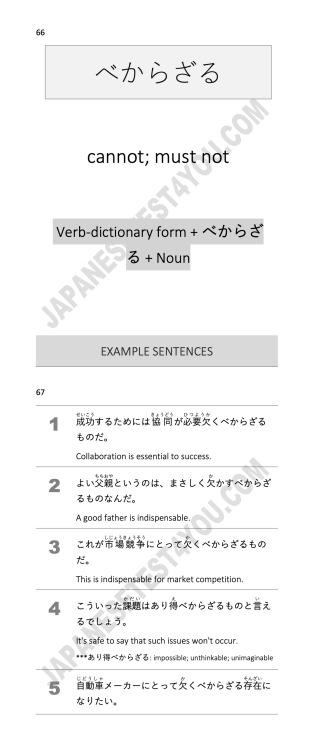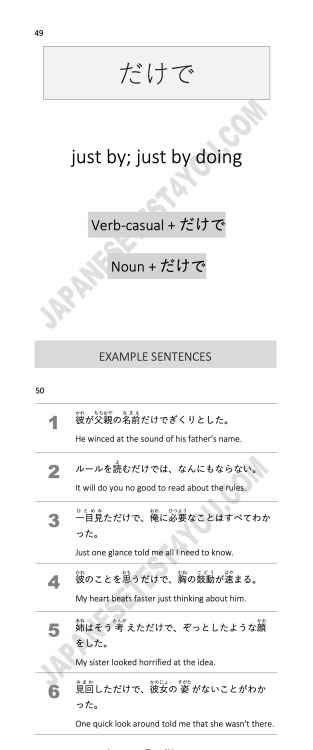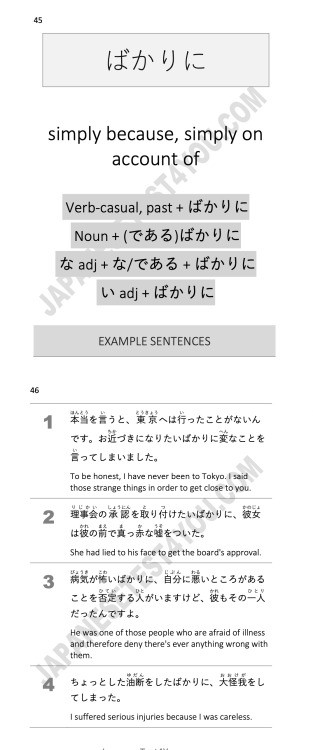#japanese grammar
JPN Grammar: 〜など (non-exhaustive list)
Source: Tobira Lesson 2
〜など indicates that the given list is non-exhaustive. When more than one item is listed, や is commonly used to connect them.
1. Structure
N1 や N2 + など + particle(は・も・が・を・に・の・etc)
2. Examples
夏休みはギリシャやイギリスなどに行こうと思っています。
日本の食べ物の中ではすしや天ぷらなどが好きです。
今学期は日本語やアジアの歴史(れきし)などのクラスを取っています。
Image sources: 1,2 (We Heart It)
Post link
JPN Grammar: 〜なければ(ならない・いけない)〜なくては(ならない・いけない)“Must/Have to”
Source: Tobira Lesson 2 and JLPT Sensei
These patterns express the idea of obligation. Although they are interchangeable, there is a subtle difference between ならない and いけない.
ならない: speaker stating their sense of obligation
いけない: sense of obligation directed towards the hearer
Obs.: To express the opposite, you can use 〜てはいけない(written)〜ちゃいけない・じゃいけない(spoken)
1. Meaning
have to; must; should
2. Structure
verb + な
い+ 〜ければ・くては(ならない・いけない)
〜なければならない(Formal: なりません Spoken: なきゃならない)
〜なければいけない(Formal: いけません)
〜なくてはならない(Formal: なりません Spoken: なくちゃならない)
〜なくてはいけない(Formal: いけません)
3. Examples
早く寝なければならない。I must go to sleep early.
私も頑張らなければいけない。I have to do my best too.
本当にすぐは行かなくてはいけない。I really have to go soon.
日本語をもっと勉強しなくてはならない。I really need to study Japanese more.
調べなきゃならないことがあるから、図書館に行って来るよ。I’m going to the library because I have something to look up.
A: 今週末、何をしますか?B: 来週の月曜日にテストがありますから、今週末は勉強しなければならない。A: What are you going to do this weekend? B: I have a test next Monday so I have to study this weekend.
A: 週末に、となりの町で伝統的(でんとうてき)な祭り(まつり)があるんですが、行けませんか。B: 面白そうですね。でも、土曜日は教会に行かなければならないんです。日曜日でもいいですか。A: There is a traditional festival on the weekend in the neighboring town. Do you want to go? B: Sounds interesting. But I have to go to church on Saturday. Is Sunday okay?
Image sources: 1,2 (We Heart It)
Post link
JPN Grammar: Adjective-stem + さ
Source: Tobira Lesson 1
The suffix さ is attached to the stem of an い-adjective or な-adjective to form a noun.
1. Meaning
-ness; -ty
2. Structure
adjective-stem + さ
広い→広さ
寒い→寒さ
元気→元気さ
便利→便利さ
(exception) いい→よさ
3. Examples
富士山の高さは3,776メートルです。
日本の携帯(けいたい)電話の便利さには、びっくりした。
この荷物の重さは何キロくらいでしょうか。
この話のよさが分からない人はいないと思います。
Image sources: 1,2 (We Heart It)
Post link
JPN Grammar: noun {で/から}できる “to be made of/from”
Source: Tobira Lesson 1
{〜で/から}できる means “to be made of/from/out of”. から indicates that the material(s) from which something is made is not immediately obvious. できる is used in generic statements while できている is used when describing something specific.
1. Meaning
〜でできる = to be made of/be made out of
〜からできる = to be made from
2. Structure
noun は{で/から} {できる/できている}
3. Examples
チーズやヨーグルトは牛乳からできます。
プラスチックは石油(せきゆ)からできます。
ワインはぶどうからできますが、お酒はお米からできます。
この皿はプラスチックで、そして、このコップは紙でできている。
日本には木でできた家が多いが、その国の家はたいてい石でできている。
Image sources: 1, 2 (via @ellinorlofgren on IG)
Post link
Source: Genki II Lesson 13.5, Tofugu
〜回 is a Japanese counter used to describe repetitive actions (“I skipped rope ten times”) and express the frequency of events over a period of time (“I shampoo three times a week”).
1. Structure:
“describe repetitive actions”
number of times + 〜回
“express the frequency of events over a period of time”
period に frequency 〜回
2. Examples:
“describe repetitive actions”
縄跳びを10回跳んだ。I skipped rope ten times.
スクワットを30回します。I’m going to do thirty squats.
“express the frequency of events over a period of time”
毎日2回お風呂に入ります。I take a bath twice every day.
More information: Tofugu
Source: Genki II Lesson 13.5
〜なら is used to express “limitation” or “contrast” in a sentence.
1. Structure:
noun (A) なら predicate (B)
B only applies to A
2. Examples:
ブラジルに行ったことがありますか。Have you ever been to Brazil? メキシコなら行ったことがありますが、ブラジルは行ったことがありません。I’ve been to Mexico, but I’ve never been to Brazil.
日本語が分かりますか。Do you understand Japanese? ひらがななら分かります。If it’s in hiragana, I understand.
Source: Genki II Lesson 13.4
〜てみる is used to express the idea of “doing something tentatively” or “trying something”.
1. Structure:
It combines the て-form with みる, conjugated as a る-verb.
て-form + みる
2. Examples:
漢字がわからなかったので、日本人の友達に聞いてみました。Because I could not understand the kanji, I tried asking my Japanese friend about it.
友達があの店のケーキをおいしいと言っていましたから、今度食べてみます。I heard from my friend that the cake from this store is good, so I will go try it someday soon.
Source: Genki II Lesson 13.3
Intermediate Japanese Review Day 2 & 3/15
Used to express an impression or inference based on direct observation. Equivalent to “it looks like” or “it seems like”.
1. Structure:
い adjectives: おいしい → おいしいそうです・おいしくなさそうです
exception: いい → よさそうです・よくなさそうです
な adjectives: 元気(な) → 元気そうです・元気じゃなさそうです (drop な)
2. Examples:
Affirmative:
このりんごはおいしいそうです。This apple looks delicious.
明日は天気がよさそうです。It looks like the weather will be fine tomorrow.
メアリーさんは元気そうでした。Mary looked fine.
Negative:
この本は難しくなさそうです。This book doesn’t look difficult.
ともこさんはテニスが上手じゃなさそうです。It looks like Tomoko isn’t good at tennis.
3. Qualifying a noun: adjective + そうな
そう can be used after an adjective to qualify a noun. そう is a な adjective, thus it is written as そうな.
暖かそうなセーターを着ています。She is wears a warm-looking sweater.
For more information: PuniPuni Japan
Source: Genki II Lesson 13.2
Intermediate Japanese Review Day 1/15
から is used to give a reason for something. When you want to express two or more reasons for something, you use the 〜し structure.
(reason 1*) し、(reason 2*) し、 (situation)。
*predicate in short form.
Sentence examples:
1. 日本語はおもしろいし、先生はいいし、私は日本語の授業が大好きです。I really like my Japanese class because Japanese language is interesting and my teacher is good.
2. 家族から手紙を来たし、彼と電話で話したし、昨日はとてもいい日でした。Yesterday was a great day because I received a letter from my family and I talked with my boyfriend on the phone.
Observation: In the present tense, だ is added before 〜し for な adjectives and nouns, but not for い adjectives.
い adjectives: おもしろいし
な adjectives: 好きだし
noun + です: 先生だし
You can also use just one 〜し clause, implying that this is not the only reason for the situation.
Sentence examples:
1. 物価が安いし、この町の生活楽です。Life in this city is easygoing. For one, things are cheap.
Intermediate Japanese Review Day 1/15
You can use the prompts below to practice potential verbs in Japanese.
Things I could do as a child:
1. 泳げました。I could swim.
2. 絵を描けました。I could draw (pictures).
Things I could not do as a child:
1. 日本語が話せませんでした。I couldn’t speak Japanese.
2. 家賃を払えませんでした。I couldn’t pay rent. *obviously*
Things I can do:
1. 食べ物を作れます。I can cook (food).
2. Photoshopを使えます。I can use Photoshop.
Things I cannot do:
1. 車を運転できません。I can’t drive. *blushes in shame*
2. ピアノを弾けません。I can’t play the piano.
You can practice more potential verbs (+ te form) using the flashcards I made here.
Source: Genki II Lesson 13.1
Intermediate Japanese Review Day 1/15
To express ability to do something (“can”) or possibility.
る-verbs: drop final -る and add -られる
見る→見られる (to see)
う-verbs: drop final -う and add える
行く→行ける (to go)
話す→話せる (to speak)
買う→買える (to buy)
泳ぐ→泳げる (to swim)
遊ぶ→遊べる (to play)
待つ→待てる (to wait)
読む→読める (to read)
死ぬ→死ねる (to die)
取る→取れる (to take)
irregular verbs:
くる→こられる
する→できる
1. The verbs below have alternative, informal variations:
見る→見られる→見れる
出る→出られる→出れる
くる→こられる→これる
2. Potential verbs conjugation pattern:
Short forms
Present: 見られる・見られない
Past: 見られた・見られなかった
Long forms
Present: 見られます・見られません
Past: 見られました・見られませんでした
て-form
見られて
3. Particles
Verbs with を particles: either が or を
漢字を読む→漢字が読める・漢字を読める
する (できる):
仕事をする→仕事ができる
Verbs with other particles:
山に登る→山に登れる
4. Sentence examples:
私は日本語が話せます。I can speak Japanese.
私は泳げないんです。Actually, I can’t swim.
雨が降ったので、海に行けませんでした。We couldn’t go to the beach because it rained.
they are both transualted into twilight in japanese but is the context for these different?
黄昏
Tasogare
薄暮
Hakumei
~ずじまいregrettably have not completed action ~
見たい映画だったのに、忙しくてとうとう見ずじまいだった。
朝から忙しくて、今日はお昼ご飯を食べずじまいだった。
~ずにいる being in the state of not having done ~ (=ないでいる)
図書館の本を返さずにいたら、図書館から電話がかかってきた。
友人に相談できずにいます。
~ずに済ませるto “finish”/”complete” without doing ~
この授業にはたくさんの本が必要らしいが、できるだけ買わずに済ませたい。
この冬は洋服を買わずに済ませます。~ずに済むto end without ~ happening
電車では間に合いそうになかったので、タクシーに乗ったら、何とか遅れずに済んだ。
これをやっとけば別れずに済んだのに ...
~ずにはいられないcan’t help but do ~
寂しくて、誰かに電話せずにはいられない。
言わずにはいられなかった。
~ずにはおかない~ is bound to occur
この映画は、見る者に感動を与えずにはおかない作品です。
身内の一人が殺されたら、恨みを晴らさずにはおかない。
- Listen to the song with the lyrics and romanization here
- Watchthe official music video andthe official dance practice
- Listen to the album medley for “Countdown” here
- The tag for “EXO”
- Other vocabulary lists
grammar
- は: (topic particle)
- に: (particle which specifies the target of a verb’s action)
- -て: (connective verb ending; may imply contrast in a sentence, “even though…”)
- -ない: (negative verb ending)
- の: (a particle that (1) modifies nouns and adjectives (2) indicates possession)
- を: (direct object particle)
- -様(-よう)(suffix meaning “method of __-ing”, “way to…” or “appearing…”, “looking…”)
- -でる: (indicates that an action is ongoing)
- -(ら)れる: (turns a verb into the passive voice)
- -たい: (expresses that the speaker wants to do something)
- で: (a particle which allows the context in which an action is performed to be specified, whether time, location, or means/way)
- が: (a particle which indicates that the speaker wants to identify something unspecified)
- -んだ(contraction of -のだ)(a masculine way of conveying an explanatory tone)
- そう: (interjection that may express that the speaker is paying attention) yes, yeah; it’s like that, that’s how it is; I see
- 迄(まで)until, up to; as far as; even, to an extent; only, merely
- かい: (masculine usage; a softer version of the 「か」question ending; may indicate a yes-or-no question)
- -ば: (conditional particle) if
- よう: (masculine usage; a helping verb which may (1) express one’s will to do something, (2) induce or stimulate the listener to do something, and/or (3) indicate that a word is for the use of, used for, or made for [something])
- だって: (conjunction) after all, because; but; (particle) even; too, as well, also; “They say…”, “I mean…”, “I hear…”
- 物の(ものの)only…, no more than…; a matter of…
- -だし: (combination of -だ, a helping verb which expresses a declarative tone + -し, a particle which lists multiple reasons for multiple states and/or actions)
- すれば: if so, in that case, in that situation
- も: (inclusive topic particle) also
- う: (a helping verb which may indicate (1) speculation, (2) invitation, and/or (3) will or intention)
- よ: (sentence ending which may indicate emphasis, contempt, request, etc.)
verbs
- 居る(いる)to be, to exist
- 成る(なる)to become, get, grow; to result in, prove to be; to play a role; to change into, to be exchanged for
- 止む(やむ)to stop, cease, be over
- 凭れる(もたれる)to lean against, to recline on; to lie heavily [on the stomach], to be uneasily digested
- 寄せる(よせる)to come near, to let [someone] approach or drop by; to include, welcome, let in [a group]; to have feelings for; to rely or depend upon
- 聞く(きく)to hear, listen; to ask, inquire
- 叫ぶ(さけぶ)to shout, shriek, scream, cry; to clamor for/against
- 飲み込む(のみこむ)to gulp down, swallow deeply, engulf; to hold back from saying something, to swallow one’s words; to understand, catch onto, digest
- 上り詰める(のぼりつめる)to be infatuated with, engrossed in, enthusiastic about; to go, climb, or ascend to the top; to reach the summit or peak
- 近づく(ちかづく)to approach, draw near, get closer; to get acquainted with, get to know
- 触れる(ふれる)to allude, to touch on a subject; to touch, to feel; to experience, perceive, come in contact with; to be emotionally moved by
- 閉じる(とじる)to close, to shut [one’s eyes, a book, etc.]
- 刺激(しげき)stimulus; incentive, encouragement, motivation, provocation; excitement, thrill
- 暴れる(あばれる)to act violently, to rage, to struggle
- 飛び散る(とびちる)to fly around, to scatter
- 痺れる(しびれる)to become numb; to be mesmerized, titillated, excited
- 為る(する)to do
- past tense: した
- 怒り出す(おこりだす)to fly into a rage, to lose one’s temper; to burst or break out, to flare up
- 焦らす(じらす)to tease, tantalize, keep [someone] in suspense; to irritate
- 利かせる(きかせる)to exercise, display, use; to season, to bring out a taste
- 手出し(てだし)to meddle, interfere
- 出る(でる)to leave, exit, go out, come out; to move forward
- 抜け出す(ぬけだす)to slip out, sneak away, break free, break out
- 歪む(ゆがむ)to warp, swerve, deflect; to be crooked, distorted, bent, slanted, strained
- 刺さる: to stick [usually something with a sharp point] into; to prick, pierce; to get stuck [in], to lodge [in]
adjectives
- 知らない(しらない)unknown, strange
- 最悪(さいあく)the worst
- 此の(この)this
- いい: (a more casual/informal reading of 「良い(よい)」) good, fine, pleasant, agreeable, excellent, okay
- 彼の(あれの)that [over there] (something mentioned that is distant psychologically or in terms of time)
- 下手(へた)unskillful, poor, awkward
- 狭い: narrow, confined, small
nouns
- 体(からだ)body; build, physique, constitution
- 此処(ここ)here; this place
- 心(こころ)heart; mind; spirit
- 間(ま)time, pause; space; room
- 君(きみ)you (masculine usage; used colloquially by females)
- 鳴り(なり)ringing sound
- 耳(みみ)ear(s); hearing
- 口(くち)mouth; taste, palate
- 音(おと)sound, noise
- 愛(あい)love; affection, care; craving, desire
- 唇(くちびる)lips
- 目(め)eye(s); look, stare, glance
- 火花(ひばな)spark
- 刺激(しげき)stimulus; incentive, encouragement, motivation, provocation; excitement, thrill
- キス: kiss
- 庭(にわ)area, field [of action]; garden, yard
- 馬鹿(ばか)idiot, fool; trivial matter, absurdity
- 幅(はば)gap, difference; range; width, breadth
- 其れ(それ)that (something close to the speaker, either physically or psychologically); that time, then
- 足(あし)foot
- 手(て)hand, arm
- 街(まち)town, block, neighborhood
- 闇(やみ)darkness, the dark; bewilderment, despair, hopelessness
- 誰か(だれか)someone, somebody
- 視線(しせん)one’s line of sight, gaze, glance, look
- 背中(せなか)the back of [someone’s] body
adverbs
- そっと: softly, gently, quietly; secretly, stealthily
- 誰にも(だれにも)anyone, anybody; (when used with a negative verb) no one, nobody
- 段々(だんだん)gradually, increasingly, little by little, more and more
- 限り限り(ギリギリ)just barely, at the very limit, at the last moment
- 未だ(まだ)as yet, only, still; more, besides; (when used with a negative verb) not yet
- 儘(まま)as it is, as one likes; because, as
- 馬鹿に(ばかに)ridiculously, unusually, exceptionally
- もう: now, soon, shortly; already, by now, [not] anymore; (an interjection used to strengthen or emphasize an emotion, often exasperation)
- 馬鹿に(ばかに)ridiculously, unusually, exceptionally















